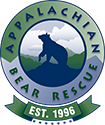We’ve been discussing bear encounters in various cities but don’t want to ignore the ones that happen in our neck of the woods. It is still news, big news, for a bear to be seen in downtown Knoxville. That happened earlier this week when a yearling “crashed” through the door of a home off of Forest View Road in Knoxville. (If you don’t know Knoxville, this is a residential area only a few miles from the downtown area). It appears the bear was spooked by someone walking their dogs at night (though who was spooked more remains to be seen).
Now, TWRA has said that if the bear is captured, it will be euthanized because it entered a home and has learned to associate food with humans. ABR works with TWRA quite closely and routinely. Our experience is that the last thing TWRA wants to do is put down any creature. We, like TWRA officer Brian Ripley said, hope that the bear will leave town on its own so that euthanization is unnecessary. Hopefully, it was so traumtized by the experience that the poor thing has learned that being around humans isn’t worth the effort.
If the bear is captured and put down don’t think it is TWRA’s fault, it is our fault. I don’t know the details of this story (other than what I have read and seen on the news) but most of the time, the underlying reason for these encounters is that the bear has been in some way fed by humans. Please don’t blame TWRA when it has to clean up our mess.
Stories like this happen from time to time even in Knoxville. In fact, I was interviewed by one local television news channel today. I am inevitably asked whether ABR could do anything to help this bear? I wish we could. The truth is that time and again, we have learned that once a bear is used to being fed by humans (including raiding garbage cans), there is really no effective way to salvage that bear so that is can live in the wild. Even if it might work for a short while, when nature’s food become scare or more difficult to obtain, the bear tends to return to raiding garbage cans and other human food sources. Worse still, that bear then teaches this “bad” behavior to other bears, multiplying the problem.
Zoos may seem like an option at first but they are not for the “nuisance” bear. There is, in fact, a long list of black bears waiting to be “placed” in a zoo. Also, it isn’t so simple just to lock up a wild bear in a cage. A wild bear isn’t all that good a candidate for a zoo. The bears ABR have successfully placed in zoos have all been bears that were in captivity (of some kind) almost from the day they were born.
Now, if money (and permitting) were no object, I would love for ABR to operate a large bear sanctuary somewhere where wild bears conditioned to being around humans could live in a natural but secure environment. Folks could come by and see bears “in the wild.” Unfortunately, no one has yet stepped up to donate the land or the money for such a place. I can dream, however.
So, my response to the inevitable question is always to emphasize that the way ABR helps is before the situation happens. We try to educate the public (this blog is one way) about living in bear country. If it hasn’t been clear before now, the several recent appearances of black bears in Knoxville should remove any doubt that Knoxville is bear country. Living in bear country carries with it a responsibility. If you don’t want to see a bear put down, act responsibly and ask your neighbors to do the same.
For your own sake, for your family’s sake, and especially, for the bears’ sakes, take up pet food at night, don’t leave out garbage overnight, and never, above all, feed any wild animal. You may think you are being humane and that it won’t hurt “just this once.” In reality it is a death sentence.
It starts with us.

